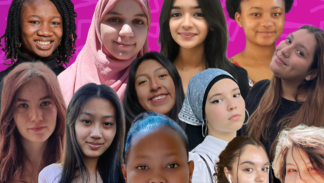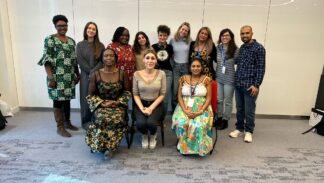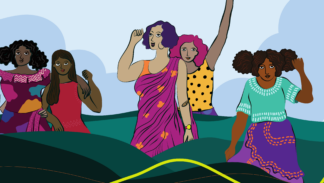The Women’s Platform Meets in Eastern Congo to Implement 2013 Peace Accord
The women leaders came by boat. They came by bus, traveling from rural areas for hours to a meeting they had been anticipating for months. Some took flights, eager to meet fellow activists for peace and women’s rights. The 50 women met in Goma, in northeastern Congo, the epicenter of a regional war that still has lingering spurts since it erupted in 1996. And during three days in May 2015, they put their heads together to craft strategies to make a 2013 peace agreement “a peace that women can feel.” They came for the first meeting of the Women’s Platform.
The Women’s Platform for the Peace, Security and Cooperation Framework is an initiative to ensure women’s participation in the peace process to bring an end to the war that has traumatized the Democratic Republic of Congo (DRC) in the region known as the Great Lakes. The war has seen 6 million deaths and systematic rape of women.
In February 2013, the governments of the Great Lakes region and the international community committed to ending the recurring conflicts in eastern DRC once and for all. The Peace, Security and Cooperation Framework for the DRC and the region — signed in February 2013 — brings 13 nations of Africa into a comprehensive pact to stop the cycles of conflict by resolving their root causes. The Women’s Platform for the Framework was launched in January 2014 by the Office of the Special Envoy of the United Nations Secretary General for the Great Lakes Region. It strengthens the momentum of activism by women who take risks daily to speak out against injustice and violence.
Global Fund for Women is the Secretariat of the Women’s Platform. We were in Goma, helping our grantees to evolve a common agenda for their work. The peace process brings in the neighboring countries of Rwanda, Burundi and Uganda – given the key role of those countries in the war – and women from each country were represented, working together to combine their talents and knowledge for a stronger regional women’s peace movement.
The Platform has three strategies — grant-making, convening, and communicating successes of women’s groups to donors. Forty groups from the DRC, Burundi, Rwanda and Uganda received the first round of Global Fund for Women grants. These groups are working to advance the peace process, to combat violence against women; to advance women’s economic options and to enabling access to ‘clean energy’ such as solar energy.
The May 2015 Women’s Platform grantee convening was a success given that women’s groups were able to deepen their understanding of the Peace, Security and Cooperation Framework as well as how to engage with other official government channels to affect peace. The grantees heard a message from the Special Envoy, particularly on the political context of the sub-region, and were inspired by each other’s Platform projects. The convening agenda included plenary presentations, breakout groups for strategizing, and a site visit to a grantee project on clean energy innovations. Learn more about the Women’s Platform here.
With political officials present, grantees took the opportunity to ask questions that usually remain among civilians: “It seems that NGOs are not integrated into the peace process. What actions are in place to punish countries that violate the peace agreement? How can awareness of the peace agreement reach rural villages? What are strategies to disable the armed groups that attack the Congo?”
At the end of three days, the women activists produced a document of key conclusions and next steps intended to make peace real in their communities. These conclusions included the need for women’s engagement in government meetings of the peace process, and support mechanisms to improve the organizational capacities of Women’s Platform grantees. Also as a result of this first convening, some groups committed to visit each other’s community to learn new skills, and to communicate about their program strategies.
After returning home, participants sent the following thank you notes to Global Fund for Women:
“This exchange of the Women’s Platform is a good initiative to jointly draft responses to the challenges which remain in order to achieve an unprecedented participation of women in the implementation of the peace accord.”
“We thank you for organizing this convening which enabled us to know each other and discuss our work. We will be able to better coordinate our activities, and also raise awareness of the peace accord.”
“We were very happy with this convening and we learned a lot and solidarity has been built between us.”
“We thank you for making grants that will improve the lives of our beneficiaries.”
Women’s Platform grantees are implementing a range of innovative programs to bring about change in their communities. Some results include:
- As a result of grantee partner Programme Amkeni Wamama’s advocacy and lobbying efforts in Ituri, Congo, three women have been assigned to local administrative posts previously held by men. Additionally, over 36 women participated in leadership training and are actively engaged in conflict prevention and resolution in local communities.
- Solidarité des Femmes de Fizi pour le Bien-Etre Familial (SOFIBEF) raised the awareness of Congolese police and military authorities on the Peace, Security and Cooperation Framework through workshops and distributing copies of the peace accord. SOFIBEF also engaged community members in the fight against gender-based violence by having them take responsibility for change. This translated into husbands referring wives to rape services despite perceived social stigma, as well as police making arrests for rape.
- ISIS-Women’s International Cross Cultural Exchange (ISIS-WICCE), created awareness on the PSC Framework and UNSCR 1325 and disseminated reports to governments. As a member of the advisory group for a global study on UNSCR 1325, Isis-WICCE participated in a regional meeting in May 2015 to review the implementation of the UNSCR 1325 in the region, identify gaps, and capture recommendations to incorporate into a UN Women global report. These recommendations formed part of the global study report that fed into the report of the UN Secretary General to the Peace and Security Council in October 2015.
- ProFemmes/Twesehamwe from Rwanda, organized meetings to raise awareness among community advocates, and 100 women in cross-border trade at the Rwanda/Congo border, about the role of women in peace building and conflict resolution.
- Promotion et Appui aux Initiatives Féminines (PAIF) has implemented legal strategies in eastern Congo for over a decade. Due to PAIF’s advocacy efforts, the public prosecutor in Kavumu, eastern Congo, convicted rape perpetrators, and the police inspector made more arrests. PAIF has already observed a change in attitude among the legal, medical, and judicial authorities regarding their treatment of gender based violence cases, and revealed that authorities are less inclined to blame the victim.
- Fonds d’Initiatives Féminines Locales (FIFL) in Burundi, trained women from farming associations on agricultural techniques, agricultural processing and storage, and market research. This work resulted in increasing women’s agricultural productivity, increasing the added value via processing, and establishing five new farm associations. This work is crucial given high rates of food scarcity and hunger in areas impacted by war. With economic stability, families and communities can rebuild and live meaningful lives.
The five implementing partners for the Women’s Platform include: The Special Envoy’s Office, Global Fund for Women, Femmes Africa Solidarité (FAS), the Office of the Special Representative of the Secretary-General on Sexual Violence in Conflict (OSRSG-SViC), and Fonds pour les Femmes Congolaises (FFC). The Women’s Platform receives funding from the Dutch and Irish governments, Oak Foundation, and several individual donors.
Muadi Mukenge
Program Director for Sub-Saharan Africa
Global Fund for Women


